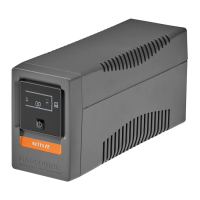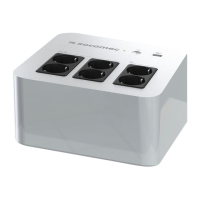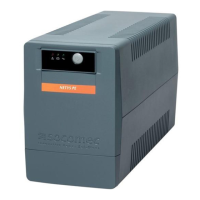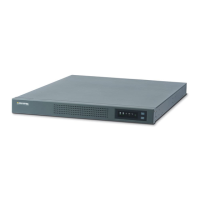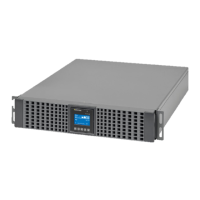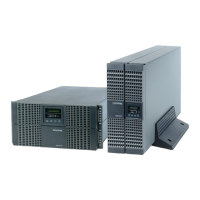Do you have a question about the socomec NETYS PR and is the answer not in the manual?
Essential guidelines for manual usage, safe operation, maintenance by authorized personnel, and hazard condition management.
Critical warnings regarding electric shock, battery handling, toxicity, disposal, and avoiding electrical hazards.
Explains the UPS purpose to protect critical equipment from electrical disturbances and how it supplies consumers.
Diagram illustrating the functional blocks of the UPS, including AVR, battery, inverter, and transfer switch.
Instructions for removing the UPS and accessories from the packing case and advice on keeping original packaging.
Guidelines on placement, ventilation, temperature, humidity, dust, and avoiding obstructions for optimal UPS installation.
Details on front panel LEDs (alarms, modes, battery), indicator bars, and control buttons for operation and configuration.
Illustrates fan fault indication via LED flashing, explaining the meaning of specific alarm signals.
Shows failure indications for fan failure, overtemperature, abnormal output voltage, battery recharge, and shortcircuit via LEDs.
Identification of rear panel connectors including RS232, USB, EPO, communication slots, output sockets, and input connections.
Illustrates the step-by-step process for converting Netys PR 1500-2000 VA units from tower to rack configuration.
Details the procedure and necessary accessories for migrating the Netys PR 3000 VA model from tower to rack mounting.
Information on connecting optional battery expansion units to increase back-up times for specific UPS models.
Diagram illustrating the input and output connections for the 1000 VA model, highlighting specific ports and cables.
Diagrams showing input, output, and battery expansion connections for 1500-2000 VA and 3000 VA UPS models.
Details how to configure output voltage (220/230/240V) and battery expansion units (0-1-2) via software or mimic panel.
Step-by-step guide for setting output voltage and battery expansion using the UPS mimic panel controls.
Procedure to select the output voltage setting (220V, 230V, or 240V) using the mimic panel buttons.
Guide to configure the number of battery expansion units (0, 1, or 2) via the mimic panel after output voltage setup.
Procedure for switching the UPS on, including waiting for self-teach and powering connected loads.
Instructions for completely shutting down the UPS, with warnings about battery charge control.
Describes the normal operating mode when mains power is stable, with loads powered directly or via AVR, and batteries recharging.
Explains operation during mains failure, using battery power via inverter, alarms, and automatic return to normal mode.
Details the overload condition, its signalling, and warnings about potential damage to the UPS from excessive loads.
Procedure for running a self-test to check battery and inverter operation, and recommendations for charged batteries.
Lists available communication software (Uni Vision, Pro) and hardware (HID, NetVision, BMS) for UPS management and monitoring.
Explains direct communication via RS232 interface for local/networked shutdown, monitoring, and programming UPS functions.
Details USB communication using HID protocol, enabling direct connection without software installation for control via OS.
Describes Net Vision card for LAN connection (RJ45 Ethernet) and remote UPS control via TCP/IP using a web browser.
